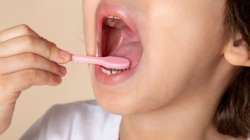Steer clear of these foods if you suffer from painful mouth ulcers
Mouth ulcers can be a painful and uncomfortable condition that can make it difficult to eat, drink, or speak. By avoiding these foods and maintaining good oral hygiene, you can promote faster healing and reduce the pain and discomfort.

Mouth ulcers, also known as canker sores, are painful lesions that can develop on the inside of the mouth, gums, or tongue. They can make it difficult to eat, drink, or speak, and can take several days to heal. While there are various causes of mouth ulcers, such as stress, injury, or viral infections, certain foods can also aggravate the condition. Here is a list of foods to avoid if you have painful mouth ulcers.
Spicy foods: Spicy foods, such as hot peppers or chili powder, can irritate mouth ulcers and make them more painful. It is best to avoid spicy foods until the ulcers have healed.
Caffeinated Tea: If you have mouth ulcers, it is important for coffee enthusiasts to monitor their coffee consumption. Due to its high salicylate content, coffee can irritate the gums and tongue. Those who are fond of coffee may need to reconsider their preferences and try to limit their coffee intake.
Carbonated drinks: Soda beverages with carbonation should be avoided if you have mouth ulcers. The acid in carbonated drinks can cause irritation to the soft tissues in your mouth and contribute to the development of ulcers. In addition, the high sugar content in these drinks can promote the growth of harmful bacteria, which may lead to infections.
Hard and crunchy foods: Hard and crunchy foods, such as chips or nuts, can irritate mouth ulcers and cause further pain. It is best to avoid hard and crunchy foods until the ulcers have healed.
Salty foods: Salty foods, such as potato chips or pretzels, can cause irritation around the ulcers and increase pain. It is advisable to avoid salty foods until the ulcers have healed.
By avoiding these foods, you can reduce the pain and discomfort caused by mouth ulcers and promote faster healing. Additionally, it is also important to maintain good oral hygiene, such as brushing and flossing regularly, to prevent further irritation around the ulcers.